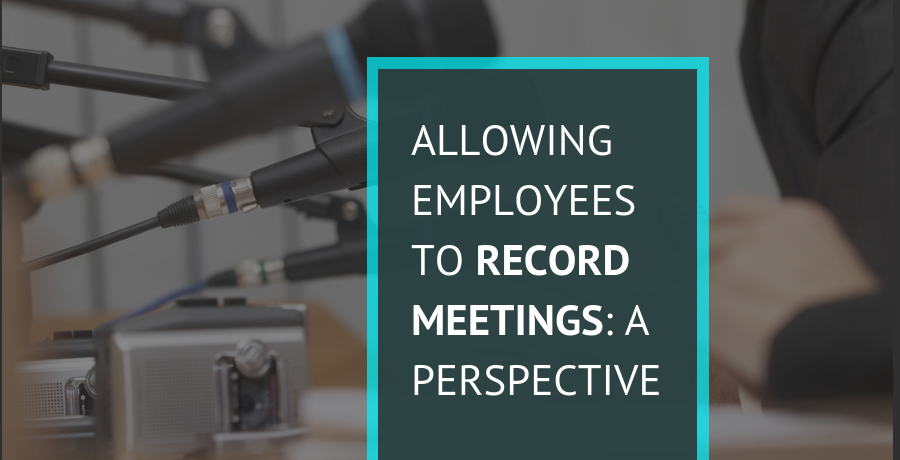Allowing Employees to Record Meetings: A Perspective
— December 28, 2018

Today, smartphones have become integral communication tools at the workplace. We use smartphones to check and respond to email, keep up with news from our favorite online publications, research information, make work-related calls, and so on.
Smartphones also have impressive multimedia capabilities. We use them to listen to podcasts and online broadcasts, watch videos, record meetings, and much more.
It is essential to have a policy covering the use of personal devices that employees may bring at the workplace. If you usually record your meetings with a smartphone, having a policy on how the devices should be used is something you should think about in this era of privacy concern.
Let’s try to answer the big question of whether you should allow employees to record meetings with their smartphones.
Why Record Meetings?
There are many benefits of recording your meetings with employees. The traditional way of taking minutes has its flaws, which can be easily avoided by audio or video recording.
Writing or typing minutes can slow down the meeting and waste valuable time. Moreover, while the minutes can summarize the things discussed, they cannot capture discussions verbatim.
A recording is the best way to capture your meeting discussion. You can record meetings using smartphones and then get the audio files transcribed by a company that specializes in business transcription services. Capturing conversations using a smartphone is easy.
Moreover, you can record videos of the meeting to have information regarding the atmosphere, mood and body language of the attendants, which can provide important information that may not be adequately captured through text.
For example, if someone is angry, their anger can be captured through their voice and facial expression when the meeting is recorded. This information would be difficult to determine if only handwritten minutes of the meeting were available.
Legal Challenges of Recording Workplace Conversations
While the ideal way of recording meetings is by using a smartphone or a voice recorder, there are some legal challenges you have to contend with. In today’s ever-increasing privacy-conscious environment, you want to be sure that you are not breaking the law by allowing employees to record meetings.
In 11 states, recording conversations with a person without his/her consent is illegal. Therefore, to record a group meeting, you will need to get the consent of everybody that might be recorded. In other states, to record a group conversation, you will need the consent of at least one person from the group.
You should check the specific laws that apply to your state to know what kind of consent is required to record your company meetings.
Generally, as the employer, you will be tasked with permitting a meeting to be recorded. This permission should be given in front of the people who are likely to be recorded during the meeting as a way of requesting consent. Employees also have a right to reject to be recorded in a conversation they are participating in.
Consult your attorney to know the extent of privacy laws in your state and how they apply to recorded conversations related to business meetings.
Setting Privacy Policies
If you wish to have company meetings recorded, you will need a privacy policy. You can develop an anti-surveillance policy for your company to put employees at ease with regards to recording meetings. In the policy, state clearly that the firm is committed to protecting the privacy of its employees and their safety.
The policy should outline employees’ rights with regards to recordings and should allow them to deny consent at any time. Having a privacy policy will go a long way in breaking any tension that employees may have with regards to recording meetings.
Sometimes, recording conversations may be necessary. For example, if employees are reporting a work harassment behavior committed by a particular individual, you may want to record the conversation for legal purposes. Just make sure that you inform the employees beforehand that you are recording the conversation and request their consent.
Moving Forward
Recording conversations at the workplace can be a tough balancing act for any company. Generally, employees should not have a problem with meetings being recorded. However, it is still important that employers request consent.
Business & Finance Articles on Business 2 Community
(20)


